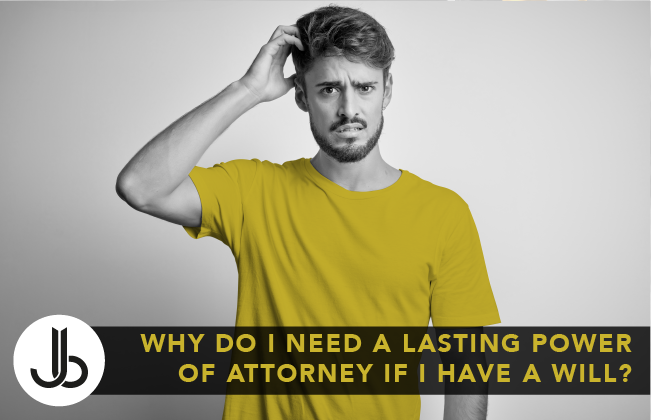

Many people confuse a Lasting Power of Attorney with a will – or assume that because they have a will they automatically have some kind of power of attorney.
To answer the question why you need a power of attorney if you have a will, here’s a very simple explanation:
So what are the differences?
The power of attorney we’re talking about here is called a Lasting Power of Attorney.
A will protects your beneficiaries’ interests after you’ve died, but a Lasting Power of Attorney protects your own interests while you’re still alive – up to the point where you die. The moment you die, the power of attorney ceases and your will becomes relevant instead. There’s no overlap.
In essence, by setting up a Lasting Power of Attorney, you give someone you trust the authority to make decisions and to act on your behalf and in your best interests – while you’re still living and breathing.
Once you reach a point in time where you need someone to act for you, it’s often too late to get a Lasting Power of Attorney set up. It’s like insurance in that respect. Once it is all set up though, you can forget about it and hope it never has to be used.
Indeed a power of attorney is vital for anyone – regardless of age – who has money and assets to protect and/or who wants someone to act in their best interest in terms of healthcare choices should they be unable to make decisions for themselves.
What are the types of Lasting Powers of Attorney?:
- Property & Financial Affairs
- Heath & Welfare
You’ll find lots of information on the internet about these and how they work.
If you’re still asking yourself why you need a power of attorney, consider the prospect of a complete stranger making decisions about your money, your house or your health and wellbeing – including where you live – while your family is powerless to do anything to protect you. That’s an example of the kind of scenario a Lasting Power of Attorney helps prevent.
In that sense, a power of attorney could conceivably be considered more important than a will – depending on your point of view – because it safeguards your interests while you’re still alive. It’s best to get both things sorted though – a will and a Lasting Power of Attorney. It’s also a good idea to have both types: Property & Financial Affairs and Health & Welfare.
Who should I choose as my attorney’s?
Remember you need this person/these people to fight for you should you no longer be able to act for yourself or make decisions for yourself while you’re still alive. These are called your attorneys. You are called the donor – because you’re giving them power to act.
If you do wait until you are no longer mentally able to act for yourself, the Court of Protection may not allow a power of attorney to be set up any more. Instead, your family will have to apply to the Court for a Deputyship order. It means that your family is the likely to have to account for their every action and expense on your behalf – including where joint bank accounts are concerned. It can be very difficult – and having to apply for a Deputyship can also be a long process and expensive, and it would be at a time when your family is already deeply distressed about what may have happened to you.
Setting up a Lasting Power of Attorney is straightforward and it gives reassurance that if you do become incapacitated for whatever reason, whoever you choose as your attorney(s) can act immediately on your behalf and in your best interests.
If two spouses or partners are making a power of attorney, they each need to do their own. It can be tempting for partners or spouses to choose the other partner or spouse their attorney. However, it’s important to consider who would be able to act if both spouses/partners are incapacitated at the same time. For this reason, many people also name an additional person or people, such an a son or daughter.
Also, spouses should not assume that one spouse can necessarily act for the other just because they’re married. The Court may not see it that way. A spouse often needs legal authority to act for the other – through a power of attorney.
How we can help
If you would like advise on any estate planning matter get in touch with our team by emailing info@johnsonandboon.co.uk, calling 0151 637 2034 or by booking an appointment through our free mobile app, available to download on both Apple and Android app stores.
